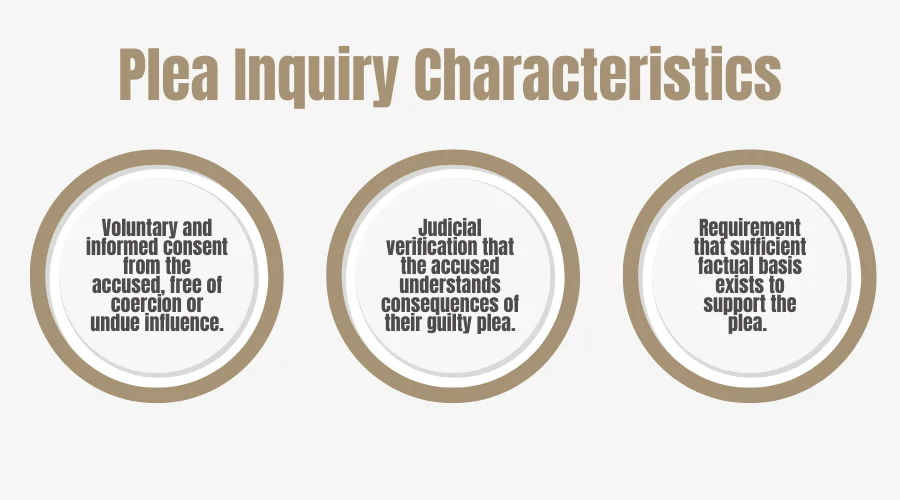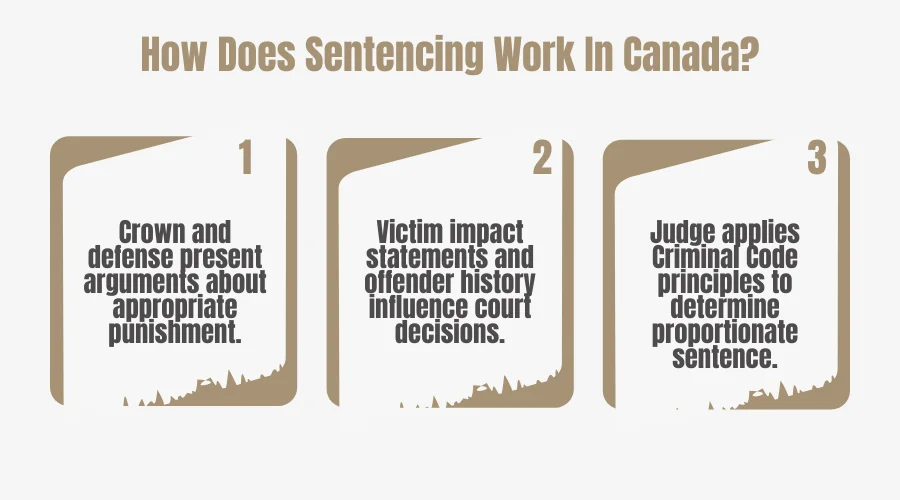Sentencing In Canada: How Does Hearings Work?

In Canada, sentencing hearings are crucial in the criminal justice system. These hearings determine the appropriate punishment for individuals found guilty of a crime. The goal is to balance various factors, including public safety, rehabilitation, and justice for victims when sentencing in Canada.
What Is A Plea Inquiry?

Before a judge accepts a guilty plea, he/she must ensure that the guilty plea is being made voluntarily. The judge must also ensure that the accused understands that he/she is giving up their right to a trial and understands that the judge is the ultimate decision maker for sentencing in Canada.
Once the judge is satisfied with this, the accused is arraigned by the court clerk on the charge or charges. The accused then must indicate to the court if he/she is pleading guilty or not guilty. Provided the accused pleads guilty, a finding of guilt is made by the judge, and the sentencing hearing begins.
What Is A Hearing For Sentencing In Canada?
A hearing for sentencing in Canada occurs after an accused person has been found guilty, either through a trial or a guilty plea. The purpose of this hearing is to allow the judge to hear submissions from both the Crown and the Defence before determining the appropriate sentence.
The Role Of Sentencing In Canada Principles
Judges rely on fundamental sentencing principles outlined in the Criminal Code of Canada, including:
- Denunciation: Sending a message that the crime is unacceptable.
- Deterrence: Preventing the offender and others from committing similar offences.
- Separation: Protecting the public by removing dangerous offenders from society.
- Rehabilitation: Encouraging offenders to change their behavior.
- Restitution: Compensating victims for their losses.
- Proportionality: Ensuring the punishment fits the crime.
Aggravating And Mitigating Factors In Sentencing Canada
Judges consider a range of aggravating and mitigating factors in sentencing Canada before determining your punishment, including:
- The gravity of the offence – More serious crimes typically result in harsher sentences.
- The offender’s criminal history – Repeat offenders may face stricter penalties, while first-time offenders may get off with a fine.
- Specific Mitigating Factors In Sentencing Canada – Elements that may reduce the severity of the sentence, such as remorse or lack of prior convictions.
- Aggravating factors – Elements that may increase the severity of the sentence, such as the use of violence, targeting vulnerable victims, or committing the crime while on bail.
- Victim impact statements – Statements from victims or their families explaining how the crime has affected them.
- Rehabilitation prospects – Whether the offender demonstrates the potential for rehabilitation.
Why Is A Criminal Lawyer Important For Sentencing In Canada?

A criminal defence lawyer plays a critical role in the sentencing process by advocating for a fair and appropriate sentence for the accused. Their responsibilities include:
1. Presenting Mitigating Factors In Sentencing Canada
Defence counsel highlights factors that may support a lighter sentence, such as the offender’s remorse, rehabilitation efforts, or lack of prior criminal history.
2. Challenging Aggravating Factors
The defence may argue against the prosecution’s claims regarding aggravating circumstances, seeking to minimize their impact on sentencing in Canada.
3. Proposing Alternative Sentences
Defence lawyers can argue for sentences focused on rehabilitation, such as probation, community service, or conditional sentences, rather than incarceration.
4. Referring to Sentencing Precedents
Criminal lawyers Mississauga present case law and previous sentencing decisions to argue for consistency and fairness in their client’s jail or life sentence.
5. Ensuring The Sentence Is Proportionate
The defence counsel ensures that the punishment aligns with the severity of the crime and does not exceed what is reasonable under the law.
6. Advocating For The Offender’s Rehabilitation
In cases where rehabilitation is possible, the defence may present evidence of treatment programs, counseling, or employment efforts to show the offender’s commitment to change.
Types Of Criminal Sentences In Canada
Judges can give several types of criminal sentences in Canada. Typically, punishments are a combination of more than one. This includes:
- Absolute Or Conditional Discharge – The offender is found guilty but does not receive a criminal conviction.
- Fines – Monetary penalties imposed on the offender.
- Probation – The offender is released under specific conditions.
- Conditional Sentences – A jail sentence served in the community under strict conditions (house arrest).
- Incarceration – A term of imprisonment in a federal or provincial facility.
- Ancillary Orders – Weapons prohibition, DNA order, and restitution order to be paid to the victim.
FAQs
Do Guilty Pleas Lead To A Sentencing Hearing?
Yes, even if you are pleading guilty, a sentencing hearing is required. The judge will hear submissions from the Crown and Defence counsel before imposing a sentence.
Are Victims Involved In The Sentencing In Canada Process?
Victims are allowed to share their side during sentencing in Canada. They can submit and/or read a victim impact statement, which describes how the crime affected them emotionally, physically and financially.
Can A Life Sentence Or Jail Be Appealed?
Every criminal sentence can be appealed by either the Crown or Defence if they believe it was too harsh, too lenient or an error in the application of the law or procedure occurred.
When Does A Hearing For Sentencing In Canada Take Place?
After a person is found guilty and convicted, sentencing in Canada takes place as soon as possible. This can occur right after an offender has pled guilty or been found guilty, or it may be weeks or months after.
Contact Us Today For Legal Defence During Sentencing In Canada
If you or someone you know has been charged, you may be facing a conviction. Consulting with a criminal lawyer Mississauga who is experienced and reputable is essential in navigating the criminal justice system. Our team at Virk Barristers is ready to assist you. Give us a call today at 416-873-4624 to set up a free consultation.
Author Profile

- Mr. Suny Virk is a reputable criminal defence lawyer in Mississauga focusing primarily on criminal law matters of clients. Mr. Virk has been awarded with the Certificate of Merit Award in Advocacy. Now, he wants to impart his knowledge and wisdom to other people who may be struggling with the Canadian legal system to serve his community.
Latest entries
 Legal AdviceApril 10, 2025Sentencing In Canada: How Does Hearings Work?
Legal AdviceApril 10, 2025Sentencing In Canada: How Does Hearings Work? UncategorizedMarch 25, 2025Cybercrime In Canada: How Criminal Law Handles Internet Offences
UncategorizedMarch 25, 2025Cybercrime In Canada: How Criminal Law Handles Internet Offences Legal AdviceMarch 7, 2025KNOW YOUR RIGHTS WHEN YOU ARE STOPPED BY THE POLICE
Legal AdviceMarch 7, 2025KNOW YOUR RIGHTS WHEN YOU ARE STOPPED BY THE POLICE Legal AdviceJanuary 24, 2025KNOW YOUR RIGHTS: 5 Things to Know When Getting Pulled Over by the Police
Legal AdviceJanuary 24, 2025KNOW YOUR RIGHTS: 5 Things to Know When Getting Pulled Over by the Police




